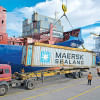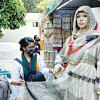How will LDC graduation impact Bangladesh’s RMG sector?

Set to officially graduate from the United Nations' Least Developed Country (LDC) category in November 2026, Bangladesh is on the brink of entering a new chapter in its development journey. The decision to proceed with the graduation on schedule, despite recent global economic shocks, was reaffirmed by Chief Adviser Prof Muhammad Yunus last month, dispelling any lingering uncertainty surrounding a potential delay. While this move symbolises remarkable progress and reflects our steady economic growth since the country's war-torn beginnings in 1971, it also brings with it significant challenges, particularly for our ready-made garment (RMG) sector, the backbone of our export economy.
Bangladesh's graduation from the LDC category is a long-awaited milestone, achieved through meeting all three of the UN's eligibility criteria: Gross National Income (GNI) per capita, Human Assets Index (HAI), and Economic Vulnerability Index (EVI). It shows the nation's impressive strides in poverty reduction, human development, and economic resilience.
Initially designated an LDC in 1975, Bangladesh benefited from a wide range of international support measures. These include duty-free, quota-free market access to many developed nations, as well as relaxed rules around intellectual property rights and development finance. These preferential treatments have helped power our rapid industrialisation and trade growth, especially in the dominant RMG sector.
The RMG sector is the crown jewel of our economy, accounting for over 80 percent of the country's exports and employing around 40 lakh people. The industry has leveraged LDC trade privileges to become the second-largest global apparel exporter after China, becoming highly dependent on the trade preferences. Presently, 78 percent of Bangladesh's exports enjoy duty-free or reduced-tariff access in 38 countries under LDC schemes. Removing these preferences will significantly alter the cost dynamics of our RMG exports, which are highly price-sensitive.
Once the LDC benefits expire, we will potentially lose over $8 billion in trade annually, and face tariffs of 12 percent or more in many major markets. For a sector built on low-cost competitiveness, these added duties could erode the price advantages that have long fuelled our global rise.
The decision to stick to the 2026 graduation deadline has stirred mixed reactions. Some economists, industry insiders, and even cabinet members had called for a deferment of two to three years, citing the economic toll of the COVID pandemic, the Russia-Ukraine conflict, and persistent global inflationary pressures. Their argument is that Bangladesh needs more time to build resilience and adjust to the impending loss of preferential market access.
Yet, the interim government, after consulting with experts, has chosen to embrace the transition, acknowledging the potential drawbacks but also preparing mitigation strategies.
One of the critical aspects of this transition is that certain LDC benefits will remain in place for three years post-graduation. This "grace period," extending to 2029, offers a window of opportunity for industries to adapt. Encouragingly, key trading partners like the European Union, the UK, Canada and Australia have signalled their willingness to maintain favourable trade terms during this transition period, albeit with some conditions.
While the concerns are valid, this graduation also presents new opportunities for our RMG sector and broader economy. Removal of the LDC status can bolster our international reputation, potentially leading to better credit ratings, increased foreign direct investment (FDI), and a greater bargaining power in global trade negotiations.
The transition could also serve as a catalyst for much-needed reforms in the RMG sector. It would incentivise manufacturers to climb up the value chain, shift towards more sophisticated products, and invest in quality, branding, and sustainable practices. There is also an urgent need to diversify export markets and reduce overdependence on a few destinations, such as the EU and the US.
Additionally, the industry must improve efficiency and productivity through automation, upskilling of workers, and infrastructure enhancements. Innovation and environmental sustainability will become critical in ensuring long-term competitiveness in a post-LDC landscape.
Our strong performance in sustainability certifications, green factories, and labour compliance could serve as differentiating factors in an increasingly conscious global market.
The garment industry, which has been both the symbol and engine of Bangladesh's rise, now stands at a pivotal moment. How well we adapt to this new environment will largely determine our economic trajectory in the coming decades.
A collaborative approach is essential. The government must actively support the private sector through targeted policy measures, including export subsidies, tax incentives, and upskilling programmes. Trade negotiations should focus on securing duty-free access under alternative frameworks such as GSP+ (Generalised Scheme of Preferences Plus) with the EU, or bilateral and regional trade agreements. Equally important is fostering innovation and value addition within the industry. Only by moving away from dependency on basic, low-margin apparel can Bangladesh truly future-proof its RMG sector.
With the right mix of policy, innovation, and global cooperation, we have the potential not just to survive the post-LDC era, but to thrive as a confident, competitive developing nation. The path ahead is steep, but not insurmountable, if navigated wisely.
Mostafiz Uddin is the managing director of Denim Expert Limited. He is also the founder and CEO of Bangladesh Denim Expo and Bangladesh Apparel Exchange (BAE).
Views expressed in this article are the author's own.
Follow The Daily Star Opinion on Facebook for the latest opinions, commentaries and analyses by experts and professionals. To contribute your article or letter to The Daily Star Opinion, see our guidelines for submission.

 For all latest news, follow The Daily Star's Google News channel.
For all latest news, follow The Daily Star's Google News channel. 










Comments